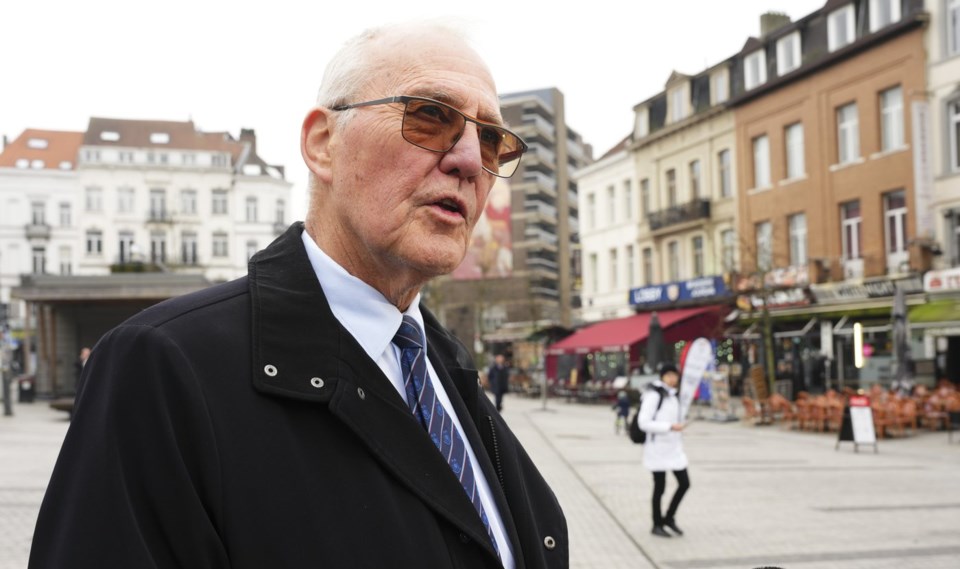BRUSSELS — Defence Minister Bill Blair said Wednesday that U.S. President Donald Trump's talk of turning Canada into the 51st state is not a "real threat" — while the prime minister said again there isn't a "snowball's chance in hell" of that happening.
The two were in Brussels to meet with NATO and European allies and members of the Ukraine Defense Contact Group. They had a breakfast meeting with NATO Secretary-General Mark Rutte on Wednesday morning.
Speaking to reporters after the meeting, Blair said that while Trump's comments are "disrespectful and concerning," he doesn't see them as a serious threat.
"Certainly we're concerned about those remarks, and I think overwhelmingly for all Canadians those remarks are offensive. We're proud of our country," he said.
"We've assured all of our allies we're prepared to stand up for our country. I do not believe that represents a real threat to us."
At a press conference later in the day, Trudeau went even further.
"As I've said unequivocally from the beginning, there's not a snowball's chance in hell that Canada will ever be the 51st state," he said.
"At the same time, from having worked with President Trump for over eight years now, I can tell you that we have to take seriously what he says."
Last week, Trudeau told a group of Canadian business and labour leaders that Trump's threat was "a real thing" tied to his administration's desire for access to Canada's critical minerals.
The Toronto Star was the first to report on Trudeau's remarks at an economic summit, which were played on a loudspeaker after journalists were asked to leave the room.
Critical minerals are materials vital to a country's economic or national security. Canada is a key supplier of 13 of the 35 minerals on the United States' critical list, including tellurium, niobium and uranium.
Canada exported $29.8 billion worth of critical minerals to the United States in 2023 — more than any other country, according to government figures. Exports to the U.S. accounted for 59 per cent of all of Canada's critical mineral exports.
Blair was set to meet with U.S. Defence Secretary Pete Hegseth for the first time Wednesday in Brussels.
Hegseth also spoke to the Ukraine Defense Contact Group, where he discussed the Trump administration's approach to the war in Ukraine.
He said Trump is bent on ending the war through diplomacy and getting Europe to assume most of the financial and military responsibility for Ukraine's defence - including the cost of a possible peacekeeping force that would not include U.S. troops.
Hegseth said those troops should not be part of a NATO mission or covered under Article 5, the alliance's mutual-defence pact.
"The United States does not believe that NATO membership for Ukraine is a realistic outcome of a negotiated settlement," he said.
NATO allies signed an agreement in 2023 to fast-track Ukraine's membership when conditions are met. Trudeau has said Ukraine cannot join the alliance as long as it is at war with Russia.
Trump also has called on NATO members to spend five per cent of their GDP on defence, something no NATO country has accomplished. A third of NATO allies — Canada included — are struggling to meet the alliance's target of spending the equivalent of at least two per cent of GDP per year on defence.
While the U.S. spends about 3.3 per cent of its GDP on defence, Hegseth told the Ukraine Defense Contact Group on Wednesday that he agrees with Trump.
"Members of this contact group must meet the moment," he said, urging leaders to start "speaking frankly with your people" about the need to spend more on defence.
Blair told reporters the alliance will have a discussion about "the appropriate level of defence spending."
"Right now, I'm focused on meeting the commitment we've already made," he said. "We're working really hard to accelerate our spending to get to the two per cent threshold Canada has committed to. I believe that is achievable."
Pressed to say whether Canada would consider increasing defence spending to five per cent, Blair was also noncommittal.
"Even the United States does not spend five per cent of its GDP on defence. The United States is a superpower and they're able to project their power and authority around the world for many of the NATO allies, including Canada," he said.
"Our responsibility is, first of all, the defence of our own country and our own continent, but also living up to our obligations to NATO, to Norad and our alliance in the Indo-Pacific."
— With files from Nick Murray and Craig Wong in Ottawa and The Associated Press
This report by The Canadian Press was first published Feb. 12, 2025.
The Canadian Press



